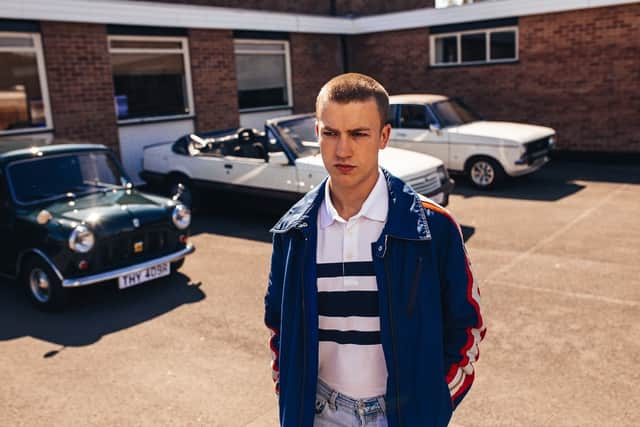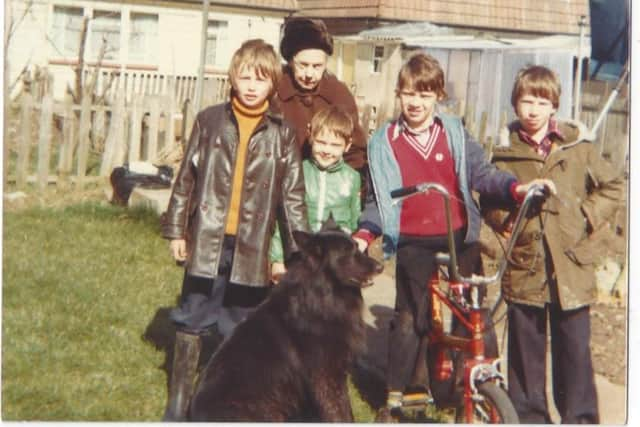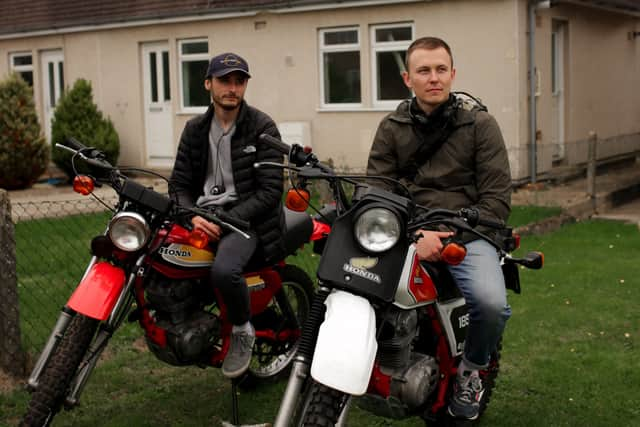‘People from Hartcliffe like my dad don’t think their lives are interesting enough to be turned into a movie’
and live on Freeview channel 276
What was it like watching your debut feature film on the big screen? The first time I saw it on a big screen surrounded by other people was the premiere at the Showcase Cinema Deluxe in Cabot Circus. It was for cast, crew, family, media and investors. We deliberately gave ourselves the naff seats right at the front. I couldn’t see the audience so I was basically just sweating and very tense, just waiting for reaction to the bits I thought were funny. The reaction was very good thankfully.
How much did the film cost to make and how did you raise the money? It cost about £250,000. It was like Dragon’s Den, we went around with a laptop to business owners in Bristol, a lot around Hartcliffe, and asked them if they liked films and if they could spare five minutes. It was very hard, very weird.
Advertisement
Hide AdAdvertisement
Hide AdSo was there a huge crew and production team? No! It’s literally myself and my friend Adam Pickford, who’s the co-producer and cinematographer. Obviously during the filming there were about 50 of us and cast members but it’s basically just the two of us steering the ship.
Was £250,000 enough to make a feature film in the end? No, we soon ran out of money. A quarter of a million is more money than I’ve ever seen but it goes very fast. We spent £50,000 before we’d even got the camera out of the box. It’s like turning on a tap at full speed, it flies out. Film is the most expensive art form - you have to just get on board and realise that if you want to make it, you’ve got to find the money.
Did you always want to be a film director? I didn’t know what I wanted to do when I was younger. I wanted to be an athlete, that was my first ambition. Actually, it was my second ambition as I wanted to be a marine biologist, but that was inspired by watching Jaws.
So what happened to the sports career? I always liked sport and I’m a very competitive person. I played rugby, then motocross but then I ended up playing golf at Knowle Golf Club where I was a member. A couple of friends were really good and tried to go professional but they didn’t make it which made me think I couldn’t either.
Advertisement
Hide AdAdvertisement
Hide AdWhen did the whole film thing kick off for you? I was always quite good at drawing so I did graphic communications, design technology, photography and computer aided design at St Brendan’s College. I loved them all, did very well in them but didn’t love them enough to pursue at university.


When did you pick up a film camera for the first time? I did a foundation in art at the SGS College Filton Campus. I did two weeks of film and animation on that course and really liked it and with UCAS fast approaching, I took a bit of a gamble and said I’d do film at Bournemouth University. Film was complicated and challenging which I liked - and I wanted my name on the film poster, that’s everybody in my class wanted.
Were you a film geek by then? No, I went to the film course with an open mind because I hadn’t made a film or directed actors or written a script - I knew films but I wasn’t into the industry or the culture. I had opinions on films but I didn’t know the names of many directors, I didn’t even know what Stephen Spielberg looked like.
Who were the main inspirations? I really liked Tarantino and Guy Ritchie films, they were my main influences. The TV series This Country was also big inspiration.
Advertisement
Hide AdAdvertisement
Hide AdWhat did your parents think of you wanting to make films? My dad is from Hartcliffe and a self-employed financial adviser now but he originally worked as a butcher and worked in a factory. My parents never pushed me into doing anything but The Fence is inspired by lots of my dad’s stories growing up in Hartcliffe in the 1970s and 1980s.
What did your dad think of seeing his stories come to life in a film? He’s proud but quite shy. It must be a weird thing because people from backgrounds like my dad don’t think their lives are interesting, they certainly don’t think they are interesting enough to be turned into a movie so it’s all a bit weird for him.
Has making the film made you see Hartcliffe in a new light? During the making of it, I talked to Vic Ecclestone a lot. He taught in Hartcliffe in the 1980s and early 1990s and he is one of the most passionate blokes about Hartcliffe. He has an undying interest and love for the area. The way he sees it is that Hartcliffe hasn’t developed in a socioeconomic way. He says the dial has hardly moved and says the government are pumping so much money into the area but you can’t see where it’s going.
Do you hope a film directed by a kid from Hartcliffe might inspire others in the area? I’m delighted to think the film might start a conversation or shine a light on somewhere that isn’t getting the right sort of attention. If it inspires one kid that you don’t have to live in London or come from a private school to have a good go at it, that’s great.
Advertisement
Hide AdAdvertisement
Hide Ad

You filmed in various Bristol locations, how did you find them? Google Earth! It’s the only way I could look at every street in Bristol in a day from the comfort of my own room rather than driving around and using a load of fuel. I did all the location scouting myself because we couldn’t afford a location manager.
Where did you film in the end? We filmed in Stockwood, Hartcliffe, Brislington, Whitchurch, Keynsham and also in Radstock.
How were the residents? Filming is so antisocial because you’re trying to stop the world spinning for a few hours so you have to talk to people and engage with them. Most people were very nice. We did do a shoot in Brislington at the Hungerford Community Centre and some bloke came out in his underpants at 4am. But I don’t blame him, we were out there all night, I’d have probably done the same.


Was it easy finding locations for a film set in the 1970s/80s? The problem with making a film about a time that wasn’t that long ago is that everything is subtly different. If you make one about the middle ages you just go to some protected town in the Cotswold where they’re not allowed to change. We did have to airbrush a lot of satellite dishes out in the final edit!
Advertisement
Hide AdAdvertisement
Hide AdThe film has a limited cinema release before becoming available to stream, did you want more people to see it on the big screen? A lot of filmmakers are mad about the fact everyone wants to watch films on their phones but it’s their choice. I go to the pub in Hartcliffe and even there people say they know about the film and say they’re waiting for it to be on the stick on Amazon Prime or on the telly and that’s fine, I get that. I wish they’d see it at the cinema but it’s a big ask these days, it’s more of an event and it’s not cheap.
The Fence is at cinemas now and then available on Amazon Prime, Sky Store and Apple TV from November 28.
Comment Guidelines
National World encourages reader discussion on our stories. User feedback, insights and back-and-forth exchanges add a rich layer of context to reporting. Please review our Community Guidelines before commenting.
